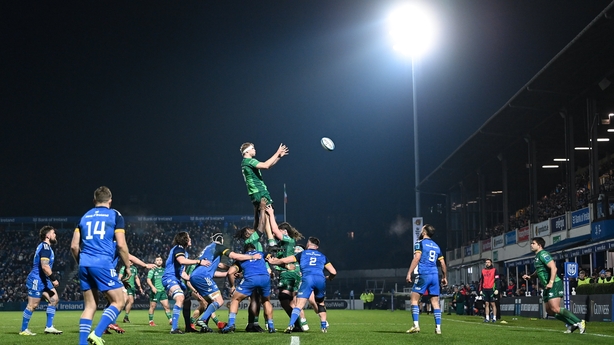The last round of the URC regular season was played last weekend, confirming the seedings for the play-offs in two weeks.
Play-off games bring a different energy compared to regular-season games. Team selection is final, there's no more shadow boxing so players know where they stand and teams will have to use their full game strategy without holding anything in reserve.
There are no second chances. The pressure comes on and there’s no chance to right those wrongs at a later stage. Mistakes will cost you more than scores or league points, too many will send you off on holidays and cut the season short.
Under pressure, teams will revert to type and the game-plan may not look as obvious as before. It’s not only environmental pressure due to the knock-out nature of the competition, the opposition will be better which means that you have to be better to show what you’re capable of.
You always hear that at the top of the game, you get less opportunities to do anything. This is because when you play against the best teams in the league, you will get less unforced errors, less set-piece turnovers, less free transition play and you also won’t be able to force as many errors because the opposition team and opposition individual players are playing at a higher standard.
When you get to the knock-out stages of any league, most teams will have a solid set piece. At least solid enough for them to launch more attacks and therefore you have to work harder to get your hands on the ball.
The likes of Niall Murray has been in disruptive form in the defensive lineout, and he might continue to be that disruptive when he gets to the Kingspan Stadium in two weeks, but Ulster will be confident in their own lineout and won’t give up as many opportunities for turnovers. Areas that you found easier to dominate during the year are tougher to get a hold of on the big stage.

The scrum will also be another area that big, physical and technically strong teams will dominate. If you’re going into the play-offs with cracks in your setpiece, you are more than likely going to come up short unless you can dominate the breakdown or if individuals can have enough instances to get a big score on the board to scrape a win.
Glasgow are the type of team that have a good enough attacking structure that they could go a long way in this competition without having an overly dominant setpiece. Their scrum struggled in the first half last weekend against Connacht until Fagerson was introduced before half-time. They were far more dominant from then on with at least three penalties going his way and against the Connacht looseheads, Buckley and Dooley.
Connacht will be confident of attacking Ulster at the setpiece and using their defensive lineout as a weapon to stop the dominant maul that Ulster have shown all season.
Pressure in these play-off games can be relieved by disrupting the opposition setpiece and it can be built massively by controlling your own. Every play has to be restarted through a setpiece so if teams can use that to crank up the stress on their opposition, it will go a long way to winning a tight game.
Defences will also be tighter, stronger, more individually capable and teams that make it to the play-offs generally have stronger squads so the gaps don’t tend to appear as the 60-minute mark approaches. Very good players can be replaced with someone close to the same quality and therefore making subs doesn’t drop off the standards that much, if at all.
In the quarter-finals, there will still be mismatches in terms of the quality of the 23 but, as the semi-finals and final approach there won’t be much between the quality of the squads that get there. Games will be won more on rugby strengths and not because one side ran out of steam.
When the defence gets better, spaces get tighter and the more fluent and cohesive attack comes to the fore.
This is why many teams wilt under the pressure of facing top teams like Leinster. The relentless stops, double hits and quality around the pitch leaves less physical space and also less room for preying on individual errors.
The attacking side of the game is where you’ll separate the quarter-finalists from the semi-finalists. One of Connacht and Ulster will go through but I’m not sure either of those teams has an attack that’s potent enough to go any further.
Connacht have the ability to make plenty of live decisions and have based their game on that in the last number of seasons. However, they are a team that may not have the quality to continue that level of decision making when the defensive pressure gets cranked up and there’s less time and space to make those decisions on your own terms.

Whereas Ulster look like a lot of their cohesion is predetermined. Against Edinburgh last weekend it was quite obvious that set piece plays have two or three phases built into them. Whether it is their outside centre, Hume or Marshall, stepping up with a tight carry from their scrum-halves, or a trick play down the narrow side, they regularly have something already set up.
This type of certainty in attack will win many regular league games and Ulster will back themselves to win the tournament but that attacking style is dependent on winning individual battles and gainline success, which is why Stuart McCloskey is so important to their game. Even more so when Billy Burns is less of an attacking threat at out-half.
Winning knock-out games means that you have to deal with the big occasion, not let it get to you and that’s where experience comes in. Some players will thrive on the extra ferocity and some will unfortunately let the game pass by - we’ve all been there. Home venues will offer a distinct advantage here.
From a coaching perspective, you have one chance to play with the right tactics to beat the opposition. A tactical strategy at the breakdown, defensive setpiece or even manipulating an attacking opportunity can be the difference between winning and losing tight games.
Something like Ireland’s counter-attacking set play versus France springs to mind. Hugo Keenan got the opportunity to deliver on the big stage because of coaching and team tactics which set the platform to deliver a big blow to France. Leinster are one of the best at manipulating similar situations from their set piece.
I would expect a least three home wins in the URC play-offs. Mainly because home advantage is a huge factor in these pressurised situations and they are also the teams that were the top performers across the season.
However, there’s bound to be a surprise in store for us yet.
Watch Leinster v Toulouse in the Heineken Champions Cup semi-final live on Saturday from 2.15pm on RTÉ2 and RTÉ Player, follow a live blog on the RTÉ News app or RTÉ.ie/Sport and listen to live commentary on Saturday Sport on RTÉ Radio 1


